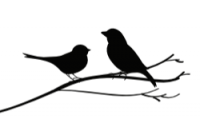The audience has put on their Sensory Deprivation Masks. Blindfolded, they are led one by one to a room booming with the sound of children at play. Overheard above the noise are murmurs of confusion and excitement from the audience.
Ghost River Theatre’s production of Ray Bradbury’s short story Tomorrow’s Child is the first installment in the company’s Six Senses Performance Series. As advertised by the company, the production is an “audio experience created for a blindfolded audience.”
Adapted for the stage by Eric Rose, Matthew Waddell, and David Van Belle, Tomorrow’s Child tells the story of Peter and Polly Horn who are expecting their first child in an alternate, futuristic 1980s. Thanks to advances in medical technology, childbirth is a highly roboticized and, consequently, predictable procedure. However, an anomaly occurs when Polly gives birth to Py. Py is born into another dimension. Instead of a pink-fleshed baby boy, the Horns become parents to a blue pyramid with tentacles. As they wait for their doctor to try and find a way to return Py back to normal, Peter and Polly are left to love their son unconditionally while trying to keep their marriage together.
Using impressive stereo technology, the audience is thrust into moments that include a series of boy names repeated (in a dreamlike fashion) by the Horns; the birth machine processing Py’s birth; and the scrutiny of neighbors who are in awe or put off by baby Py’s “alien” form. There is no denying the quality of the sound, but the novelty of the experience does run thin after awhile.
At the expense of telling the story at hand, the audience is hit with an over indulgence of sci-fi/futuristic sounds. Certainly, there are parts of the soundscape that help expand the world and characters crafted by Bradbury. But then, there are other parts where Ghost River Theatre’s preoccupation with capturing the authenticity of what sci-fi “sounds” like interrupts what is an otherwise solid adaptation of a compelling story.
From both the script and performances, we get the heart of what (most) sci-fi revolves around: ordinary people set against extraordinary circumstances. It is just unfortunate this particular adaptation is framed in the way it is – a sensory experiment. Otherwise, maybe we could have explored more in-depth the relationship between Peter and Polly.
Nonetheless, the production is enjoyable. Fans of science fiction will rejoice at the fact the company treats the plot concept as a springboard for human drama, as opposed to something ridiculous or cheesy. The company did well to choose this particular story/genre as their entry for Hearing seeing as how the audio play format works well for a story that conceives of an almost unimaginable being from another dimension.
Overall, Ghost River Theatre’s production of Tomorrow’s Child piques our interest to what will come in the rest of the company’s Six Senses Performance Series. It is indeed exciting to think just how the company will feature the other senses, including one particular “sense” they have added to the traditional five: intuition. That being said though, hopefully the company does find a balance between gimmick and substance.
Ghost River Theatre’s production of Tomorrow’s Child ran from September 9th-13th at the University of Calgary campus (Craigie Hall).
The production was presented as a partnership between the University of Calgary’s School of Creative and Performing Arts and Theatre Lab Performance Institute.
Tomorrow’s Child was a featured event of Beakerhead 2014 (Beakerhead.org)
